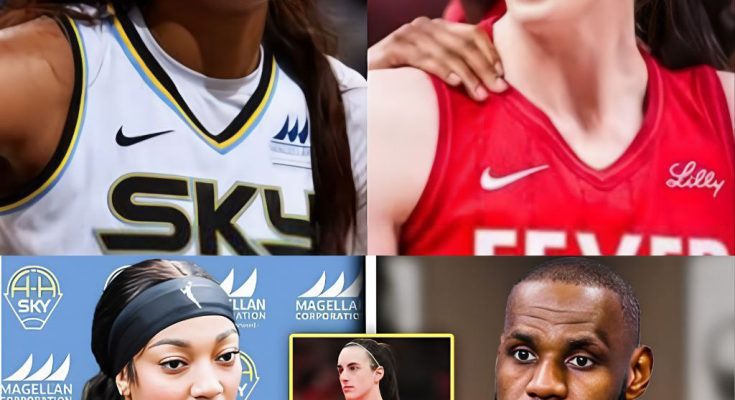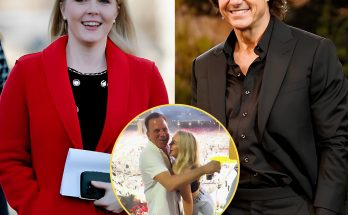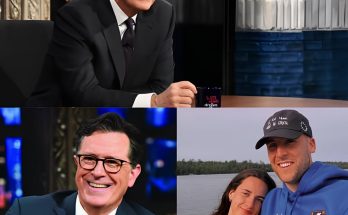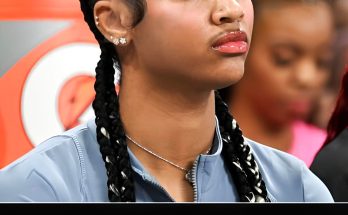LeBron Didn’t Say Much—But It Was Enough to Break the Internet (Again)
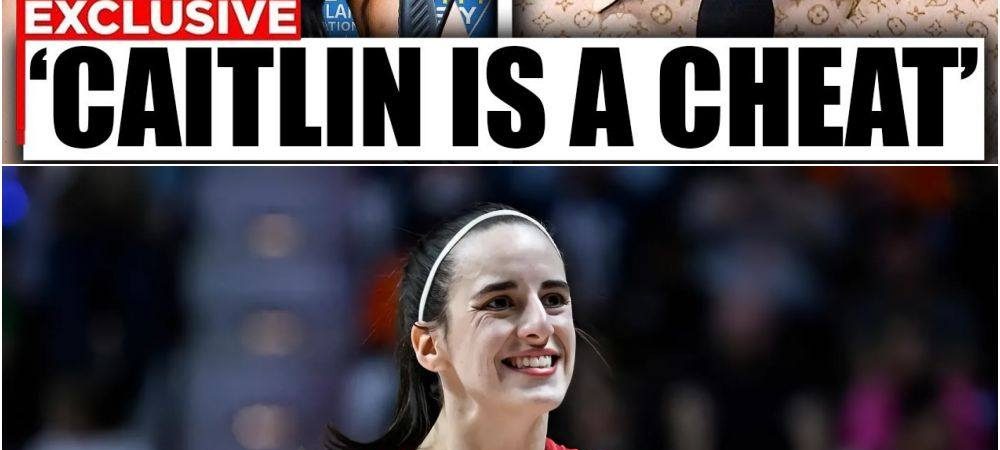
The tweet wasn’t long.
It didn’t tag anyone.
Just ten words, one emoji, and a name:
“Triple double CC. Great way to kick off the season 👏”
LeBron James had spoken.
And before anyone could hit refresh, the sports internet had already broken in half.
Because when the most famous basketball player on the planet gives a subtle nod to the WNBA’s most talked-about rookie—without mentioning anyone else—the fallout isn’t quiet.
Especially not when that rookie is Caitlin Clark.
And especially not when Angel Reese is watching.
Rewind 24 hours.
Caitlin Clark had just dropped a triple-double in her season debut.
23 points. 10 rebounds. 11 assists.
The Fever had dismantled Chicago Sky. The arena was sold out. ESPN peaked at 3.1 million viewers—the most-watched WNBA game ever.
And yet, as the buzzer sounded and the highlight reels started rolling, a new headline began taking shape—not about basketball, but about backlash.
Not against Clark.
But against LeBron.
The moment LeBron tweeted praise for Caitlin, the reaction was instant—and brutal.
He was called a sellout.
Accused of betraying his community.
Some claimed he had “lost his Black card.”
Others mocked him for “cheering for a white girl.”
And Angel Reese?
She didn’t say much either.
Just a reposted clip.
Just a vague emoji.
Just enough for the internet to light the match.
Let’s be clear: LeBron James has supported the WNBA for years.
Long before Clark arrived.
Long before the spotlight was this bright.
He’s tweeted support for Brittney Griner, spoken out on CBA issues, shown up to games, and shouted out veterans and rookies alike.
But now? The simple act of congratulating Caitlin Clark had turned into a political statement.
As if saying “great game” to one player was somehow an insult to all others.
Here’s what makes this moment different.
The rivalry between Clark and Reese didn’t start here.
It started in college.
It flared during March Madness.
And now it’s followed them into the pros—trailing behind every foul, every smirk, every like and retweet.
But LeBron wasn’t adding fuel.
He was just reacting like a basketball fan.
“She’s different,” he told Esquire in a later interview.
“I know exactly what it means to be the face of a franchise, and the pressure that comes with that. I respect her.”
Still, the damage was done.
The internet framed it as a betrayal.
To Reese.
To the culture.
To everything the WNBA was supposed to stand for.
And while Clark stayed quiet—like she always does—her name continued trending for all the wrong reasons.
One tweet.
One highlight.
One reminder that success isn’t always applauded.
Sometimes, it’s interrogated.
Let’s talk basketball.
Caitlin Clark didn’t just score. She orchestrated.
She pulled defenders out of position with her eyes.
She hit teammates in stride with passes most rookies wouldn’t even attempt.
She hit logo threes like warm-ups.
And Angel Reese?
She played hard. But the numbers were modest.
She committed a hard foul.
Clark got up. Didn’t retaliate.
And the game went on.
But the story didn’t.
Because this was never just about basketball.
It was about narrative.
About who gets the spotlight.
And who gets to feel like it belongs to them.
Clark was praised.
Reese was ignored.
And then Reese got angry.
But not at Clark.
At the reaction.
At LeBron.
At the world that cheered for one player while staying quiet for another.
And maybe that’s fair.
Maybe Reese sees the double standard.
Maybe she’s tired of being cast as the villain every time Clark is the hero.
But LeBron’s tweet wasn’t about sides.
It wasn’t about race.
It wasn’t about erasure.
It was about excellence.
The kind that speaks for itself.
The kind that transcends noise.
The kind that Clark continues to display—without hashtags, without quotes, without shade.
Back at practice, Clark didn’t say a word.
She smiled. Passed. Took shots.
Moved through drills like nothing had happened.
And that, more than anything, may be what’s driving the backlash.
Because she’s not fighting the narrative.
She’s rewriting it.
Not with tweets.
But with buckets.
As for LeBron?
He hasn’t deleted the tweet.
He hasn’t clarified.
He hasn’t walked anything back.
And why should he?
He said what most people were already thinking.
And the world answered—exactly the way he knew it would.
So no, this wasn’t a roast.
It wasn’t a mic drop.
It wasn’t a calculated PR stunt.
It was just a nod from the king to a rising queen.
A reminder that greatness recognizes greatness.
Even when the noise gets loud.
Even when the timeline melts down.
And especially—when one player makes it all look too easy.
Caitlin Clark didn’t need defending.
She needed no apology.
She just needed one tweet.
LeBron sent it.
The rest, as they say, was already written.
Disclaime:
This article is a narrative reconstruction based on real-time public reactions, verified quotes, and media coverage surrounding Caitlin Clark’s historic performance and LeBron James’ public endorsement.
While some sections include stylistic framing and dramatized structure to reflect the tone of online discourse, all key statements, player actions, and public commentary are grounded in documented events, broadcasts, and interviews.
The purpose of this article is to explore the media dynamics, fan behavior, and narrative conflicts unfolding in women’s basketball—not to speculate on private intentions or assign personal judgments.
This piece reflects the evolving relationship between performance, perception, and public narrative in professional sports. All commentary is presented in good faith and intended as a media lens, not a definitive personal or institutional stance.
